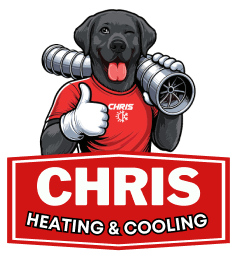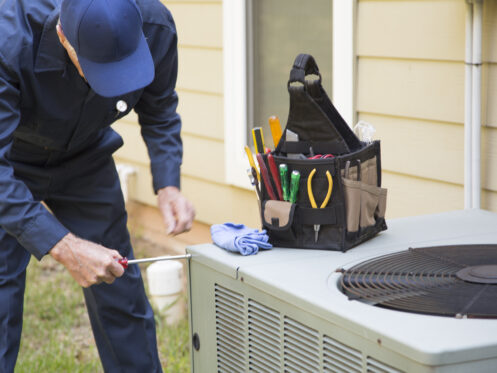Being able to keep your home at a comfortable temperature throughout the entire year starts with having the appropriate heating and cooling systems. As each year passes, HVAC technology continues to get more energy-efficient and provides more comfort for homeowners throughout the country. If you’re not up-to-date on HVAC technology, we’re going to share with you some of the coolest innovations that are changing the future of HVAC for the better.
Smart Thermostats
Smart thermostats are a revolutionary HVAC technology that is helping transform the way homeowners interact with their home heating and cooling systems. First, homeowners are able to remotely control their thermostat settings from anywhere they have internet connectivity. This is perfect for those times when plans change. Second, smart thermostats offer learning algorithms where your HVAC system gets to know your family’s habit.
It will then make suggestions on setting changes that can better optimize your energy usage. Lastly, smart thermostats offer a variety of programmable controls and alert you to important items, like when your HVAC system’s air filter needs to be changed. Due to their exponential increase in usability over traditional programmable thermostats, smart thermostats are no doubt the future of residential HVAC systems.
High Efficiency Systems
As the country becomes more eco-conscious about its energy usage, HVAC manufacturers have taken the hint. New products on the market are offering more energy-efficient heating and cooling systems than in the past. Some of the most popular items include geothermal heat pumps, advanced heat exchangers, and variable refrigerant flow systems. Thanks to these newer systems, homeowners can enjoy using less energy and paying less money on their monthly utility bills.
Indoor Air Quality Solutions
With more people experiencing allergies and respiratory conditions, HVAC manufacturers have been working diligently to construct solutions for enhancing indoor air quality levels for consumers. Some common indoor air quality products on the market today for consumers include HEPA air filters, electronic air purifiers, and UV germicidal lights. All of these solutions work to remove unwanted airborne pollutants to boost a home’s overall indoor air quality level.
Zoned Systems
Another major revelation in the HVAC technology market is zoned HVAC systems. Instead of an entire home’s temperature being controlled by one thermostat, zoned systems allow for different temperatures in different areas of the home. This means you can set your bedroom to one temperature and your living room to another. This helps to increase comfort and allows homeowners to be more efficient with their energy usage, thanks to area temperature customization.
More Eco-Friendly Refrigerants
Refrigerant is an imperative component of any well-functioning HVAC system. It’s responsible for transporting heat from one location to another. Traditional refrigerant compounds have been found to negatively contribute to the global warming epidemic. As the HVAC industry has faced more pressure from eco-friendly advocates, they’ve started to produce more environmentally-conscious refrigerant, like R-32 and R-1234ze. HVAC manufacturers are starting to integrate these better refrigerants into their new system products.
Movement Activated Air Conditioning
What if your air conditioning system could kick on when it senses that you’ve entered a room? That’s what engineers at MIT are currently constructing. This system uses a variety of sensors that are placed along a room’s ceiling. Whenever human movement is sensed, the cooling system turns on. This type of revolutionary cooling system technology is intended to help homeowners enjoy more energy-efficient system operation.
Mobile Customer Apps
Another way that technology is enhancing residential HVAC systems is by integrating mobile customer service apps. Now, HVAC companies can offer their customers the ability to schedule maintenance services, report breakdowns, and so much more. This works to enhance the customer’s experience with the HVAC company and helps to ensure a quicker response time when issues do arise. This customer resource management technology also helps to send out friendly reminders of when maintenance service is needed to keep customers’ HVAC systems in peak operating condition.
Fresh Air Ventilation
To reduce the risk of airborne pathogens and produce a healthier environment, HVAC manufacturers are working to introduce fresh air ventilation into their new heating and cooling systems. Even further, new technology has advanced to pre-treat the incoming fresh air so that it won’t be at such a drastically different temperature than the rest of the indoor air. While this technology has been constricted mainly to the commercial marketplace, it’s likely to soon find its way into the residential market.
Automated Diagnostics
Both AI and IoT can help to better inform homeowners of issues with their heating and cooling systems. These systems will utilize various sensors to take numerous measurements of a system’s performance. Each measurement will be compared to a baseline to check for any deviations. When deviations are noted, it’s an indication that there’s a problem developing with the HVAC system. Thanks to automated diagnostic technology, your HVAC technician can be informed of what the operational deviation is so they can further evaluate the issue.
Nanotechnology
Nanotechnology is on the cusp of some groundbreaking achievements in the HVAC industry in two main ways. First is the nano-coatings that can be applied to HVAC components. This helps to drastically reduce unwanted debris buildup on the system’s components and helps to establish better airflow and longer system longevity. Second is the nanoparticles. These have been shown to enhance heat transfer efficiency in both heating and cooling processes.
IoT Integration
The Internet of Things has started to integrate with HVAC systems to make them more efficient. Newer HVAC systems can be outfitted with various sensors that can detect environmental parameters like humidity levels and air quality. As this specialized system collects data, it’s sent to the main framework of the system so that it can make automated adjustments to the HVAC system’s settings. With this responsive technology, home climate control is a true breeze for any homeowner.
Dual-Fuel Heat Pumps
The efficiency of heat pumps are hard to beat. However, when heat pumps are installed in climates where temperatures can dip below freezing for extended periods of time, their efficiency starkly decreases. However, with the integration of a dual-fuel heat pump, efficiency levels have gone back up. This type of system will rely on traditional heat pump technology down to a temperature of around 35 degrees Fahrenheit. Then, they’ll switch to using natural gas fuel instead of electricity as it’s more efficient at lower temperatures.
Thermally Driven Air Conditioning
Not yet on the widespread market, thermally driven cooling systems are just breaking into the HVAC industry. This cooling system is specifically powered by solar energy and supplied with natural gas. With its double-chiller design, thermally driven air conditioners are extremely energy efficient and are considered to be a low-cost alternative to traditional air conditioning units.
Top-Notch HVAC Services
Chris Heating & Cooling provides top-notch HVAC services for the entire city of Chicago, IL. Our helpful technicians can also assist with all of your commercial, ductless mini-split, radiant floor, and indoor air quality needs. Simply contact our office today to get put on our service schedule.






